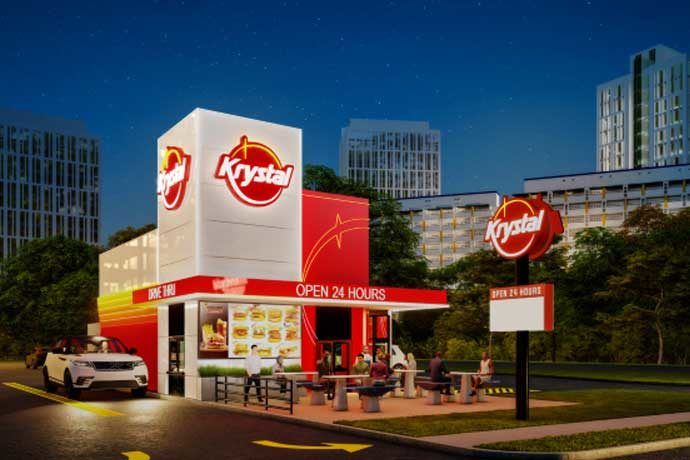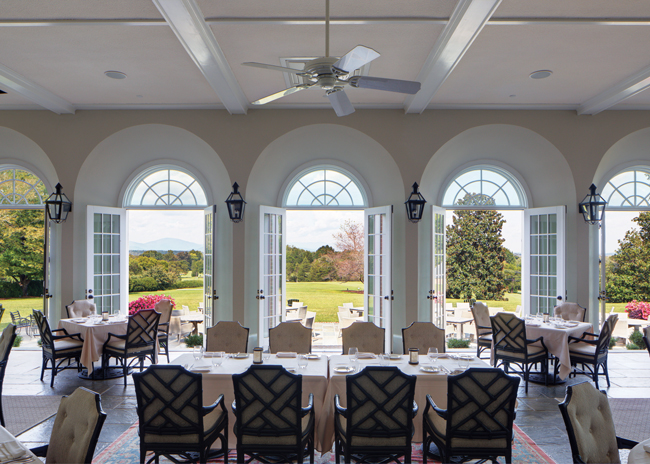 Dan Wu closed his restaurant, Atomic Ramen, in Lexington, Ky., in May 2020 after his landlord refused to grant him a rent abatement. Image courtesy of Dan WuIn May 2020, Dan Wu closed Atomic Ramen in Lexington, Ky., after his landlord refused to grant him a rent abatement in March. Though it was approved a month later, it was too late for chef-owner Wu, who wishes he’d requested a release from his rent sooner. He had to pay back rent and lost his security deposit.
Dan Wu closed his restaurant, Atomic Ramen, in Lexington, Ky., in May 2020 after his landlord refused to grant him a rent abatement. Image courtesy of Dan WuIn May 2020, Dan Wu closed Atomic Ramen in Lexington, Ky., after his landlord refused to grant him a rent abatement in March. Though it was approved a month later, it was too late for chef-owner Wu, who wishes he’d requested a release from his rent sooner. He had to pay back rent and lost his security deposit.
Working with a landlord is a delicate business but it doesn’t need to be fraught. In 2020, many operators renegotiated their rent under extreme circumstances, and many of those same operators who survived have lease renewals coming up fast.
It’s a great time to take stock after an unprecedented year, to think about what would benefit your restaurant, what you need for the future, and to find a way to work with your landlord to come to favorable terms.
Rent is typically the biggest fixed cost for restaurant operators, but it should never be more than 8% to 10% of revenue. “If you’re paying more than 10%, you’re probably not going to make a profit,” says Dale Willerton, professional commercial lease consultant, The Lease Coach, in Orlando, Fla.
Restaurant operators typically renew their location leases every five years, which is a great time to make some adjustments. In fact, if you do, you can make some great gains, either financially or in building improvements, but you can’t if you don’t ask.
Think Long Term
Many restaurants sign an initial lease for 5 or 10 years and include two option terms at 5 years each. This is an advantage for both the restaurant tenant, who knows what the rent will be for 20 years, and the landlord, who has secured a long-term tenant.
 "When negotiating a lease, do not opt for market rate increases for the optional terms." —Thomas NguyenWhen negotiating a lease, do not opt for market rate increases for the optional terms, says Thomas Nguyen, associate, tenant representation, with commercial real estate firm CBRE, Houston, because you don’t know what that rate will be.
"When negotiating a lease, do not opt for market rate increases for the optional terms." —Thomas NguyenWhen negotiating a lease, do not opt for market rate increases for the optional terms, says Thomas Nguyen, associate, tenant representation, with commercial real estate firm CBRE, Houston, because you don’t know what that rate will be.
It’s far better to work in a percentage, such as a 2% increase annually, or 10% every five years, so everyone knows what to expect “and it’s a win-win for everyone,” Nguyen says. “Your rent is higher than your initial term but at least you know what it’s going to be. If you opt for market rate increases it could be dramatically higher than 10%, especially if you’re in an area that’s been gentrified.”
Negotiate your personal guarantee into the lease very carefully. “A lot of restaurateurs aren’t aware of what they can negotiate, and some have guaranteed the entire 10 years so if they close after three, they could be on the hook for the remaining seven years,” Nguyen points out.
Instead, he recommends a burn-off clause, so any remaining rent will burn off after a specified amount of time, or once the landlord has recouped what he or she has spent on commission and improving the building. What really helps in these negotiations, Nguyen adds, is having an experienced broker who deals primarily in commercial real estate and even more specifically in retail and restaurants, who knows the market and what’s current.
Discuss Terms in Advance of Your Renewal
Don’t contact your landlord a week before your lease is set to expire and expect him to be happy to work with you. Contact him around six months in advance, says Willerton.
And don’t wait for him to contact you, says Asher Rubinstein, partner, Gallet Dreyer & Berkey law firm in New York City. “What if he’s an absentee landlord or a huge hedge fund?”
 "Savvy negotiators may want to try and get as much as possible then have a fallback." —Asher RubinsteinAlso, check the terms of your lease. It may stipulate when you need to renew by, and that date is important.
"Savvy negotiators may want to try and get as much as possible then have a fallback." —Asher RubinsteinAlso, check the terms of your lease. It may stipulate when you need to renew by, and that date is important.
And you can contact your landlord earlier than that, too, says Nguyen. “It can be one less thing for the landlord to worry about if a restaurant re-signs, and helps you have a good relationship with him or her.”
Ask for Everything you Want
If you’ve rented your location for more than 10 years, you’ve proven yourself to your landlord and it’s a good time to ask for something back.
Ask for everything you need, says Willerton. Included in what you can ask for are new equipment, furniture, flooring, bathroom renovations, and an outdoor seating area, he notes. And usually, this is paid out in tenant improvement (TI) dollars, meaning the landlord gives the tenant money to do the work. Another way is to negotiate several months rent-free, Willerton says, “so you have the money but in a slightly different way.”
And be sure to ask for everything you want, not just one thing, Willerton says. “Operators need to think long term for their business, not short term and just focus on the rent.” And Rubinstein says: “Savvy negotiators may want to try and get as much as possible then have a fallback.”
These improvements, notes Izzy Kharasch, president, Hospitality Works, Deerfield, Ill., also increase the value of the landlord’s building. “If you’re renting, you don’t want to pay for [improvements], but it helps the landlord in the long run,” he says.
Ask for Pandemic Protection
This is also an ideal time to add a new provision in case of another pandemic or government lockdown, says Lewis Gelmon, president and CEO of Johnny Rockets Canada Restaurant Group Ltd. and an independent restaurant consultant based in Vancouver, B.C.
 "This is also an ideal time to add a new provision in case of another pandemic or government lockdown." — Lewis GelmonMost landlords are not going to allow a tenant to put in a force majeure, which means the lease can be broken immediately based on something like a pandemic, says Kharasch. But it’s a good idea to ask the landlord if you can create a plan together in case of another global emergency. “It’s to the landlord’s advantage as well as the restaurant’s,” he explains.
"This is also an ideal time to add a new provision in case of another pandemic or government lockdown." — Lewis GelmonMost landlords are not going to allow a tenant to put in a force majeure, which means the lease can be broken immediately based on something like a pandemic, says Kharasch. But it’s a good idea to ask the landlord if you can create a plan together in case of another global emergency. “It’s to the landlord’s advantage as well as the restaurant’s,” he explains.
In the case of an emergency such as a pandemic, it’s a good idea for a restaurant to pay a percentage of sales, such as 5% or 10%, until business returns to normal. “I’ve seen landlords who have not done that. And they have lost pretty much every tenant,” Kharasch points out. “With rent between 5% and 10% of sales, you should be able to develop a successful business. If a restaurant operator can’t afford the rent, their operational costs are out of control.”
Think hard about what happens if there’s another pandemic, says Nguyen. What rent do you pay? When does that kick in? Does it depend on your capacity? What constitutes a shutdown? “You have to lay out all the scenarios,” he says. “Look at a doomsday scenario and the more you do that the more harmonious it is when the time comes. There wasn’t a blueprint for the past year, but it’s a good idea to have something written down.”
Research the Landlord
Landlords, who used to be in the driver’s seat when it came to making demands, are no longer in this position after COVID-19. “Look at the other spaces in the building you’re in — are they empty? If so, you’re in a good position to negotiate. Willerton advises looking at what the landlord is buying and/or selling: How well is he or she doing? Also, call other tenants in the building to find out how they’re doing. “Your strength depends on it,” he says.
“COVID has shifted the balance of power to a great extent,” says Rubinstein. “If a restaurant survived COVID, it is probably thriving, so the tenant has the advantage of bargaining power.” Meanwhile, bringing in a new restaurant that’s untested and unproven can be a risky endeavor, he points out, while also adding construction costs.
The more you know about your landlord the better; you don’t want to make an enormous payment to make up for several months’ rent then see the landlord file for bankruptcy. But, at the same time, notes Rubinstein, remember that the landlord is still human, with bills of their own to pay.
Talk it Out
When you approach your landlord, make it unclear whether you’re going to renew your lease. “You want to hear them say they’ve enjoyed having you; then you know they want you to stay. The key is to make the landlord pursue you to stay,” says Willerton.
 "Come fully prepared to your meeting with your landlord. Do a thorough walk-through of the building and look at updates, changes." —Izzy KharaschCome fully prepared to your meeting with your landlord. Do a thorough walk-through of the building and look at updates, changes says Kharasch, even if you plan to make the changes yourself. Since it’s the landlord’s building he or she needs to be completely on board.
"Come fully prepared to your meeting with your landlord. Do a thorough walk-through of the building and look at updates, changes." —Izzy KharaschCome fully prepared to your meeting with your landlord. Do a thorough walk-through of the building and look at updates, changes says Kharasch, even if you plan to make the changes yourself. Since it’s the landlord’s building he or she needs to be completely on board.
And have your financials ready, Kharasch advises, so you can show your landlord if your business has been badly impacted and you can discuss the reasons why business has been difficult.
Listen to your landlord, who may offer suggestions to you, as a restaurant operator. “They know the building and the physical structure and may also have some ideas that could be helpful to the owner of the business,” says Kharasch.
If you can communicate effectively, your landlord can understand and help you reach a solution to your challenges.
Nguyen recommends sitting down for a casual meeting to chat about the state of the restaurant with your landlord, then emailing any supporting documents, such as financials, afterward, to keep the initial conversation light. “It’s best to have that relationship or they’re treating you as a number and nothing else. A landlord will always appreciate knowing what is going on.”



